
|
El Reglamento europeo en materia de inteligencia artificial: notas críticas sobre la clasificación de los riesgos y las medidas de seguridad para los trabajadores
El uso de herramientas basadas en (o potenciadas por) la inteligencia artificial implica - al igual que cualquier otro factor organizativo empresarial - riesgos específicos que requieren soluciones específicas para garantizar que no comprometan los entornos de trabajo ni el bienestar de los trabajadores. Son riesgos que el empresario debe evaluar antes de introducir una nueva tecnología y prevenir... |
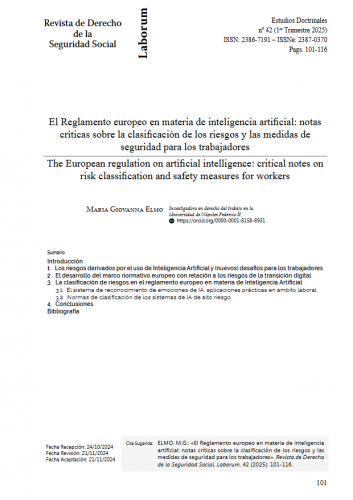
|
||
| https://revista.laborum.es/index.php/revsegsoc/article/view/... | ||||

|
La protección de la seguridad y salud en el trabajo a distancia en Italia
El presente estudio ofrece un análisis del marco jurídico que regula la protección frente a los riesgos laborales en el trabajo a distancia en Italia. En particular, se examinan las distintas modalidades de trabajo a distancia y, dentro de estas, las disposiciones relativas a la seguridad y salud en el trabajo. El objetivo es proporcionar al lector una perspectiva crítica y completa sobre la... |
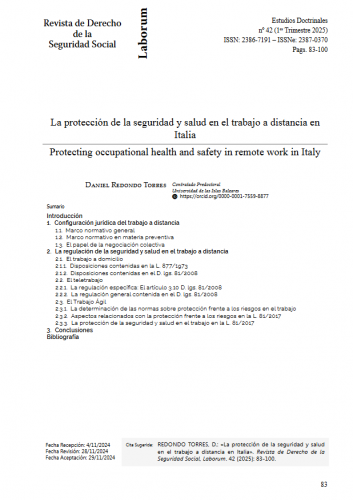
|
||
| https://revista.laborum.es/index.php/revsegsoc/article/view/... | ||||

|
El envejecimiento activo de los trabajadores autónomos ante un cambio de escenario tras el pacto sobre pensiones 2024
El presente estudio analiza el régimen de compatibilidad de la pensión de jubilación con el trabajo, en concreto, por cuenta propia, con motivo de la aprobación, recientemente, del Acuerdo social para la mejora de la compatibilidad de la pensión de jubilación con el trabajo, para la regulación de un nuevo procedimiento de acceso a la pensión de las actividades con elevada peligrosidad y para el... |
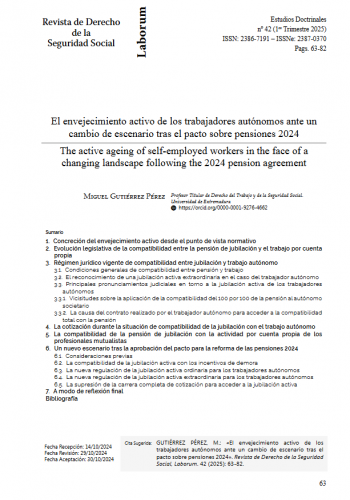
|
||
| https://revista.laborum.es/index.php/revsegsoc/article/view/... | ||||

|
El problema de los falsos trabajadores desplazados: entre el control del fraude y la necesaria protección social
Tienen la consideración de trabajadores desplazados aquellos que son enviados por su empresa para prestar un determinado servicio, de manera temporal, a un país diferente de aquel en el que se encuentra la sede empresarial. La naturaleza de este desplazamiento se fundamenta en el ámbito de aplicación de los principios clásicos de libertad de circulación e igualdad de trato. Con el fin de no... |
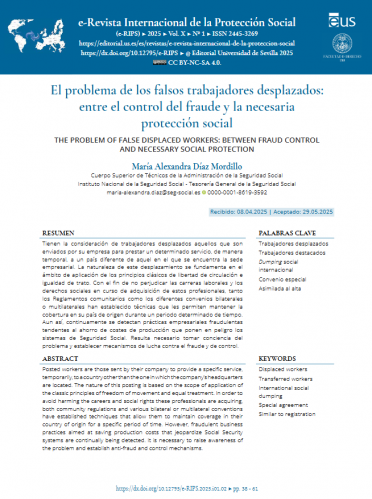
|
||
| https://revistascientificas.us.es/index.php/erips/article/vi... | ||||

|
Comparativa de la financiación vía cotizaciones en las pensiones y edad de jubilación: Situación en Alemania, España, Francia, Italia y Suecia
El análisis revisa la financiación a través de cotizaciones de los empleados y empleadores y la revisión de edad de jubilación en cinco países de la Unión Europea; Alemania, España, Francia, Italia y Suecia, se comparan similitudes o diferencias que existen entre países sobre la financiación y edad de jubilación, los países seleccionados representan el 60% de la Unión Europea. En España, el... |
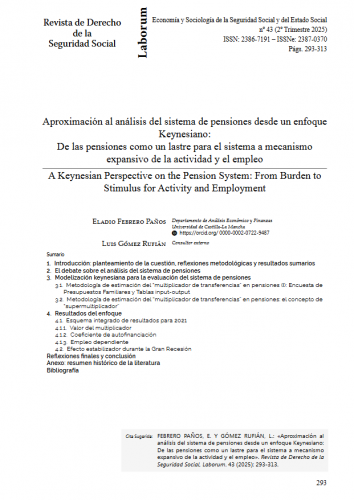
|
||
| https://revista.laborum.es/index.php/revsegsoc/article/view/... | ||||

|
Aproximación al análisis del sistema de pensiones desde un enfoque Keynesiano: De las pensiones como un lastre para el sistema a mecanismo expansivo de la actividad y el empleo
En este trabajo se ofrece una visión alternativa del impacto de las pensiones de un sistema de reparto en un sistema económico. Frente a la visión convencional, que las considera como una carga para el sistema, que reduce la oferta de trabajo y el ahorro (y la inversión), desde un punto de vista Keynesiano pueden comprenderse como un mecanismo que, a través del principio de la demanda efectiva,... |

|
||
| https://revista.laborum.es/index.php/revsegsoc/article/view/... | ||||

|
Sobre el principio de integralidad a la luz del derecho fundamental a la salud en Colombia
El artículo analiza el principio de integralidad en el derecho fundamental a la salud en Colombia, destacando su evolución desde una visión asistencial a un enfoque holístico que abarca todas las dimensiones del ser humano. A través de un enfoque cualitativo hermenéutico y el análisis de contenido de fuentes y jurisprudencia, se identifican patrones que evidencian la interrelación del derecho a la... |
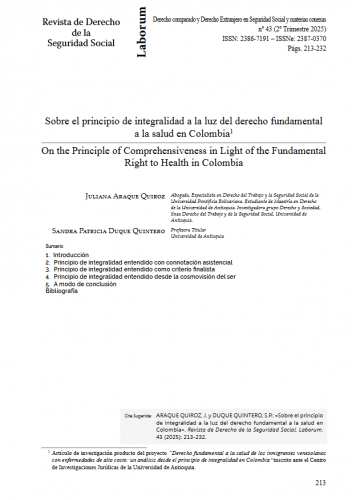
|
||
| https://revista.laborum.es/index.php/revsegsoc/article/view/... | ||||

|
Medidas de Seguridad Social, Laborales y de atención a las personas con rentas con bajas, adoptadas en Italia para 2025
En el presente artículo se analizan las principales medidas aprobadas para 2025 en los ámbitos de Seguridad Social, laboral y de Inclusión. Primeramente, con carácter general, destaca la gran ausencia de Diálogo Social entre el Gobierno y los interlocutores sociales. En cuanto a la Seguridad Social, se observa el mantenimiento de los requisitos para el acceso a la pensión de jubilación anticipada... |
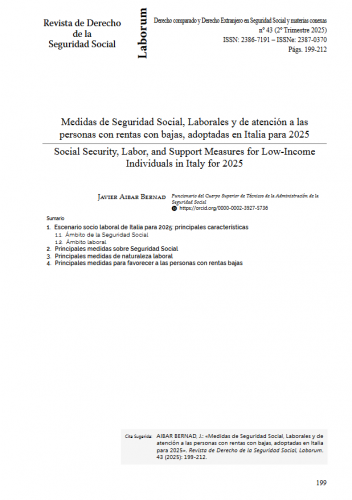
|
||
| https://revista.laborum.es/index.php/revsegsoc/article/view/... | ||||

|
La «Sentencia Herrenberg», última palabra del Tribunal Federal Alemán de Seguridad Social sobre la distinción entre trabajo autónomo y trabajo dependiente
Este celebre caso, resuelto por el Tribunal Federal alemán de Seguridad Social el 28 junio 2022, convulsionó el contexto social en que venían actuando las escuelas municipales de música en Alemania, al declarar que la relación de servicios existente entre una profesora de música y la escuela municipal de música de la ciudad de Herrenberg era un contrato de trabajo. (AU) |
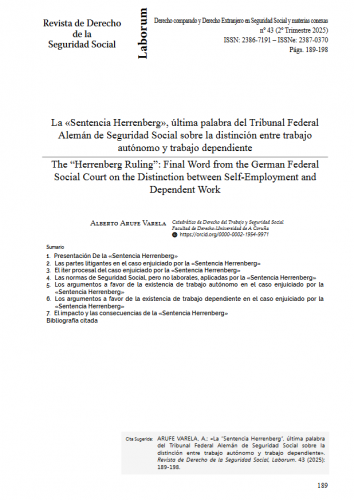
|
||
| https://revista.laborum.es/index.php/revsegsoc/article/view/... | ||||

|
La protección de los derechos de las personas LGTBI en el ámbito laboral: una actuación preventiva obligatoria a través de las medidas y los protocolos de acoso y violencia
La Ley 4/2023, de 28 de febrero, para la igualdad real y efectiva de las personas trans y para la garantía de las personas LGTBI fue publicada en el BOE el día 1 de marzo de 2023. En su art. 15 se concreta una obligación doble para las empresas: la adoptación de medidas y recursos para la igualdad real y efectiva de las personas trans y un protocolo de actuación para la atención del acoso y... |
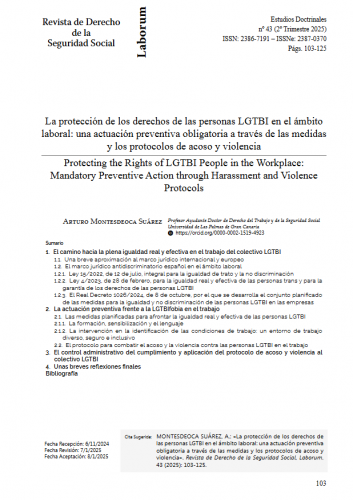
|
||
| https://revista.laborum.es/index.php/revsegsoc/article/view/... | ||||